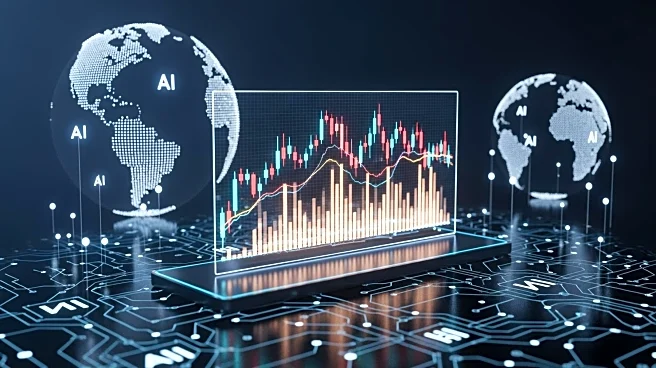What's Happening?
The stock market has shown remarkable resilience in 2025, with the S&P 500 up approximately 13% year-to-date despite geopolitical tensions and new tariffs. The year began with optimism driven by investments
in artificial intelligence (AI), but faced turbulence in April when President Trump announced tariffs that briefly shook investor confidence. Since then, the market has rebounded, with the S&P 500 surging over 20% from its mid-April low. This marks a potential third consecutive year of double-digit gains, a rare occurrence historically. The current rally is reminiscent of past eras of significant market growth, such as the 1920s and 1990s, which were characterized by both prosperity and eventual downturns.
Why It's Important?
The ongoing market rally highlights the transformative impact of AI on the economy, with sectors like semiconductors and cloud computing leading the charge. While some experts warn of frothy valuations reminiscent of the dot-com bubble, others argue that AI represents a structural shift akin to the advent of electricity or the internet. The market's resilience underscores the importance of patience and strategic investment, as history shows that the S&P 500 rewards long-term investors despite periods of volatility. The current situation poses both opportunities and risks for investors, as the market could either stabilize or continue its upward trajectory depending on AI's productivity gains.
What's Next?
The future of the stock market remains uncertain, with potential outcomes ranging from a cooling off period to further growth driven by AI advancements. Investors are advised to focus on quality businesses and capable management teams, maintaining a long-term perspective amidst market fluctuations. The historical lesson of resilience suggests that while predicting market movements is challenging, strategic investment in strong companies can yield positive returns over time.
Beyond the Headlines
The AI-driven market rally raises questions about the sustainability of current valuations and the potential for a bubble. The ethical and economic implications of AI's integration into various industries could lead to significant shifts in employment and productivity. As AI continues to evolve, its impact on society and the economy will be closely monitored by policymakers and investors alike.










